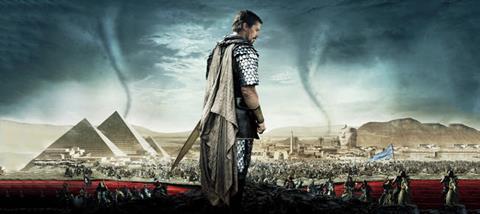
The story begins with Moses, one of Pharaoh’s generals and living in his palace, being blissfully unaware of his Hebrew birth. The story of him being placed in a basket and being found by Pharaoh’s daughter is told later when Moses’ origins are explained to him. Until this time, only Miriam and the woman that Moses calls 'mother' know the truth. Pharaoh must have been the only person who wouldn’t have guessed that two people called Moses and Miriam might just be Jewish.
Ridley Scott’s Exodus has some points of comparison with Gladiator, which he also directed. Both tell stories of an ageing ruler who has greater trust in an adopted heir than he does in his own son. This causes the son to bear a grudge against the usurper, causing the character to go underground before exacting his revenge in the final reel. It is to Scott’s credit that he manages to keep faith in the biblical account while reusing an old plot.
Viewers will also be reminded of Braveheart, although Moses’ speech before crossing the Red Sea is actually very different from William Wallace’s in that those in Wallace’s army already had their freedom and were trying to keep it, while Moses was trying to win freedom for his people in the face of certain malcontents who thought slavery in Egypt was preferable to getting their feet muddy as they crossed the Red Sea.
Fans of Robin Hood films might have been waiting for Moses – wearing a hood to disguise himself – to fire off an arrow and save the hostages Pharaoh was hanging to force the Hebrew people to hand over their leader. Alas for those hanging; Moses kept his bow under his tunic.
So, is this film ‘safe’ for Christians? Well, yes and no. It is safe in that it is pretty faithful to scripture. However, when the reality of the final plague – the death of every firstborn son – is seen on screen, it offers a challenging view of how God hands out judgement. It could be argued that the Egyptian overlords get their just desserts after 400 years of mistreating the Hebrew slaves (which Scott also depicts in all its brutality). But, when the firstborn son in every Egyptian family stops breathing as the angel of death passes over their homes, it is hard not to ask questions about the proportionate nature of this action. Moses himself challenges God on this, but gets short shrift. It might well be the case that people who find faith in God difficult will question whether there might have been another way to set God’s people free.
Exodus is not only faithful to the biblical account; it is also faithful to the idea that understanding God’s actions, and following where he leads, is not like following a divine guidebook. This was shown to best effect when the Red Sea wasn’t parted in conventional Hollywood style. Instead the people, led by Moses, had to wade in not knowing how deep it was but believing that God would somehow lead them across.
Simon Carver is a Baptist minister and film reviewer for Premier Christian Radio
Request a free copy of Premier Christianity mag here.


























